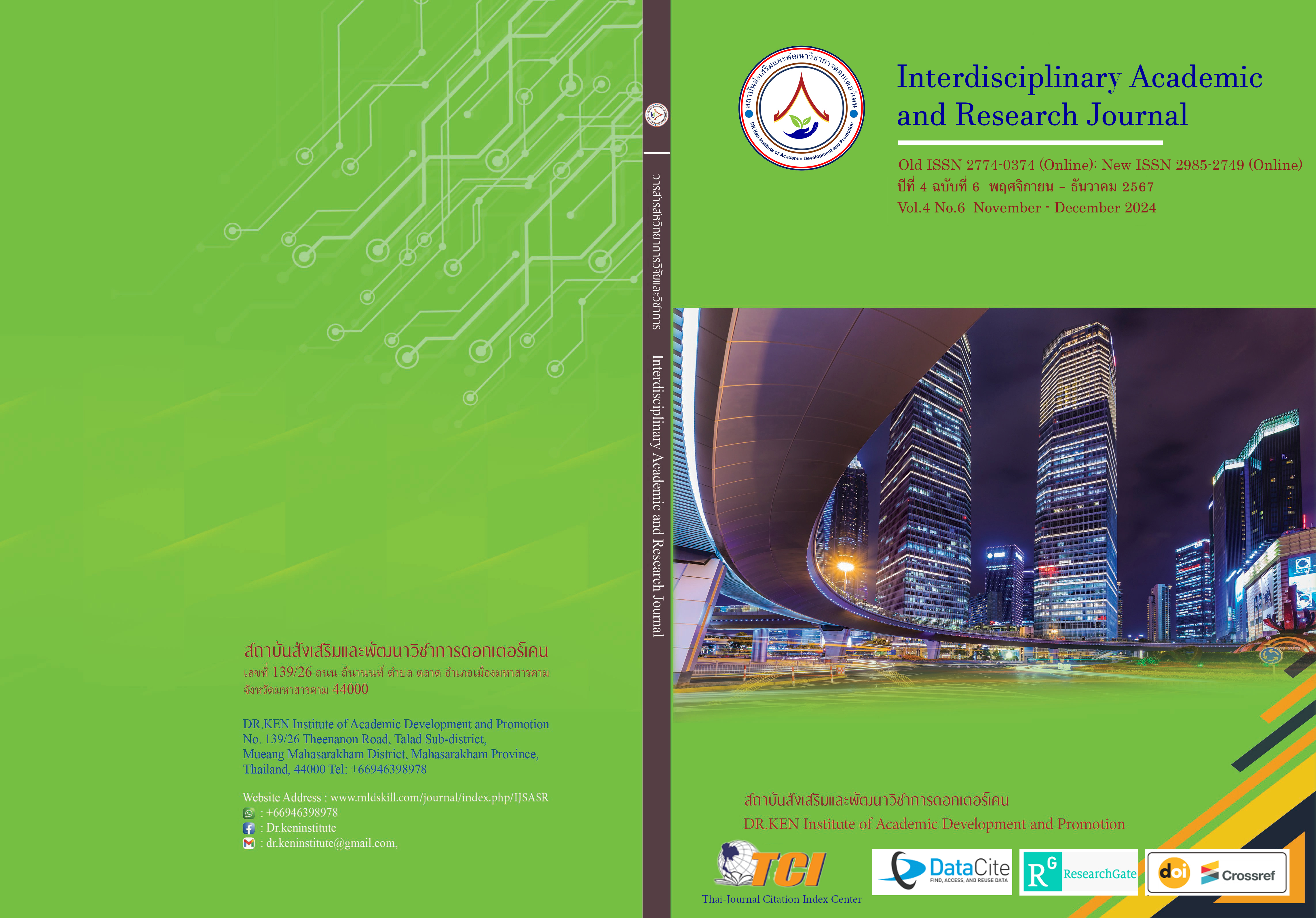The Impact of Green Human Resource Management on Work Performance of Personnel at Rajabhat University in Thailand
DOI:
https://doi.org/10.60027/iarj.2024.278416Keywords:
Green Human Resource Management, Work Performance, Rajabhat UniversityAbstract
Background and Aims: Nowadays, human resources will be the most important and real cost. Because humans with knowledge, understanding, and technology will be an important base and advantage in production and because the present and future world will change greatly and quickly. The purposes of this research were: 1) to study the level of green human resource management of personnel at Rajabhat University in Thailand. 2) to study the level of work performance of personnel at Rajabhat University in Thailand. and 3) to study the influence of green human resource management on the work performance of personnel at Rajabhat University in Thailand.
Methodology: Quantitative research by collecting data from 320 executive committees of Rajabhat Universities in Thailand and a set of questionnaires were the research tool. Statistics used for data analysis were mean, standard deviation, multiple correlation, and stepwise multiple regression analysis.
Results: 1) overall green human resource management is at a high level. and when considering each aspect, it is at a high level in every aspect, including vision and guide of green, recruitment and selection of green personnel, training, and development of green personnel, evaluation and rewarding of green personnel, and green organization culture. 2) overall work performance is at a high level. and when considering each aspect, it is at a high level in every aspect, including quality of work, job success, value and most benefits, and satisfaction. and 3) green human resource management consists of vision and guide of green (\beta = 0.285), recruitment and selection of green personnel (\beta = 0.252), training and development of green personnel (\beta = 0.166), evaluation and rewarding of green personnel (\beta = 0.147), and green organization culture (\beta = 0.099) has a relationship and impact positively on work performance of personnel at Rajabhat University in Thailand.
Conclusion: green human resource management has a relationship and impact positive on the work performance of personnel at Rajabhat University in Thailand.
References
กฤตภาคิน มิ่งโสภา และณกมล จันทร์สม. (2564). แรงจูงใจที่ส่งผลต่อประสิทธิภาพการปฏิบัติงาน. วารสารวิทยาการจัดการปริทัศน์, 23(2), 209-222.
ชัยวัฒน์ เพ็งกรูด และภัทริยา พรหมราษฎร์ (2564). คุณลักษณะองค์กรสมรรถนะสูง ที่ส่งผลต่อประสิทธิภาพการปฏิบัติงาน ของบุคลากรสายสนับสนุน มหาวิทยาลัยราชภัฏบุรีรัมย์. วารสารวิจัยและพัฒนา มหาวิทยาลัยราชภัฏบุรีรัมย์, 16(2), 123-133.
วัชระ เวชประสิทธิ์ (2564). รูปแบบกลยุทธ์การจัดการทรัพยากรมนุษย์สีเขียวที่ส่งผลต่อผลการดำเนินงานอย่างยั่งยืนของสถานประกอบการที่เป็นมิตรต่อสิ่งแวดล้อมในประเทศไทย. วารสารบริหารธุรกิจศรีนครินทรวิโรฒ, 12(1), 57-79.
ศรากุล สุโคตรพรหมมี, สุรพร อ่อนพุทธา, วิญญู ปรอยกระโทก, และวรางกูร อิศรางกูร ณ อยุธยา. (2566). ผลกระทบของการจัดการทรัพยากรมนุษย์สีเขียวที่มีต่อประสิทธิภาพในการผลิตมุ่งเน้นสิ่งแวดล้อมในกลุ่มอุตสาหกรรมยานยนต์สมัยใหม่. วารสารเครือข่ายส่งเสริมการวิจัยทางมนุษยศาสตร์และสังคมศาสตร์, 6(3), 54-72.
สกุลกาญจน์ แสนภูวา. (2558). การพัฒนาทรัพยากรมนุษย์ โดยการจัดแผนพัฒนารายบุคคลของข้าราชการศาลยุติธรรมในศาลชั้นต้น จังหวัดขอนแก่น. การค้นคว้าอิสระรัฐศาสตรมหาบัณฑิต. มหาวิทยาลัยมหาสารคาม.
สมใจ ลักษณะ. (2552). การพัฒนาประสิทธิภาพในการทำงาน. กรุงเทพฯ: ธนรัชการพิมพ์.
สุรางค์ บุญยะพงศ์ไชย (2565). ปัจจัยที่มีผลต่อประสิทธิภาพในการปฏิบัติงานของบุคลากร. วารสารวิชาการสังคมมนุษย์ มหาวิทยาลัยราชภัฏนครศรีธรรมราช, 12(1), 64-90.
Black, K. (2006). Business statistics for contemporary decision making. 4thed. New York: John Wiley and Sons.
Daryani, S.M., & Amini, A. (2016). Management and Organizational Complexity. Procedia - Social and Behavioral Sciences, 230, 359-366. DOI: https://doi.org/10.1016/j.sbspro.2016.09.045
Jabbar, M.H., & Abid, M. (2014). GHRM: Motivating Employees towards Organizational Environmental Performance. MAGNT Research Report, 2(4), 267-278.
Jabbour, C.J.C., & de Sousa Jabbour, A.B.L. (2016). Green human resource management and green supply chain management: linking two emerging agendas. Journal of Cleaner Production, 112(3), 1824-1833. DOI: https://doi.org/10.1016/j.jclepro.2015.01.052
Kim, J.Y., Kim, G.W. MinChoi, H., & Phetvaroon, K. (2019). The effect of green human resource management on hotel employees’ eco-friendly behavior and environmental performance. International Journal of Hospitality Management, 76, 83-93. DOI: https://doi.org/10.1016/j.ijhm.2018.04.007
Krejcie, R.V., and Morgan, D.W. (1970). Determining Sample Size for Research Activities. Educational and Psychological Measurement, 30, 607-610. DOI: https://doi.org/10.1177/001316447003000308
Melnyk, S.A., Sroufe, R.P., & Calantone, R. (2003). Assessing the impact of environmental management systems on corporate and environmental performance. Journal of Operations Management, 21, 329-351. DOI: https://doi.org/10.1016/S0272-6963(02)00109-2
Renwick, D.W.S., Redman, T., & Maguire, S. (2013). Green Human Resource Management: A review and research agenda. International Journal of Management Reviews. 15(1), 1–14. DOI: https://doi.org/10.1111/j.1468-2370.2011.00328.x
Wehrmeyer, W. (1996). Greening People, Human Resources and Environmental Management. Greenleaf, London.
Downloads
Published
How to Cite
Issue
Section
License
Copyright (c) 2024 Interdisciplinary Academic and Research Journal

This work is licensed under a Creative Commons Attribution-NonCommercial-NoDerivatives 4.0 International License.
Copyright on any article in the Interdisciplinary Academic and Research Journal is retained by the author(s) under the under the Creative Commons Attribution-NonCommercial-NoDerivatives 4.0 International License. Permission to use text, content, images, etc. of publication. Any user to read, download, copy, distribute, print, search, or link to the full texts of articles, crawl them for indexing, pass them as data to software, or use them for any other lawful purpose. But do not use it for commercial use or with the intent to benefit any business.
















.png)


